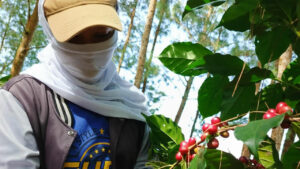By Adrian H. Halili, Reporter
NESTLED in the high mountains of Benguet province is Agnep Heritage Farms, which seeks to elevate Arabica bean production in the Philippines through its shade-grown coffee.
“The high elevation could be a good place for [growing] arabica,” Noemi L. Dado, farm manager at Agnep Heritage Farms and chief executive officer at Agnep Agri-products Corp., told BusinessWorld in an online interview.
She and her family started the coffee farm in 2018 and started producing small batches of coffee beans three years later. “A discussion ensued with my husband and my other daughter and we decided it to be a family venture.”
The farm sits on a five-hectare property owned by her husband. “It is mostly forest land and it’s vacant. Nobody ever planted there, it’s just pine trees.”
Benguet is a key source of the country’s coffee supply, thanks to its high altitude, which is ideal for coffee bean cultivation.
“Our farm is at least 1,620 meters above sea level. High-elevation coffee benefits from cooler temperature and it has a slower maturation process. It allows the beans to develop more complex sugars and acids,” Ms. Dado said.
“The slower growth allows the plant to focus more energy on the bean production, enhancing the development of desirable flavors,” she added.
She said the farm, where the harvest occurs from December to April, initially produced 300 kilos of coffee cherries in the first year, steadily increasing to 500 kilos in the second year. Coffee cherry production had doubled to a ton by 2024.
Ms. Dado said the canopy of trees on the farm provide shade to the coffee trees. “Our coffee is grown under shade conditions. Environmentally, it promotes biodiversity by providing habitats to various species, improves soil health by retaining moisture and enriching nutrients, and protects the water supply from contamination,” she added.
She farm provides habitat to birds that act as a natural control against pests.
“The canopy of the shade-grown coffee in our farm is at least 40% foliage,” Ms. Dado said. “There are a lot of birds in our coffee farm that help control pests. We have a very wonderful diversity of bees and birds that eat the bad insects.”
She said they don’t use any pest control measures, which boosts biodiversity and environmental protection.
“A lot of our customers are also environmentally conscious, and they love the idea that we are using sustainable practices and we also don’t use chemical fertilizer,” she added.
Arabica coffee beans grown in Agnep Farm is sold online through its website, social media page or e-commerce platforms like Shopee.
“After the first year, it became harder because not many home brewers like to buy expensive coffee,” Ms. Dado said. “We sold our coffee at premium prices in the first two years. We sold mainly to home brewers in Manila.”
She said they started selling green coffee beans in the past year to two coffee shops in Manila — Angkan Coffee Company and The Giving Café. The shops bought 60% of their harvest in 2024.
She said it is easier to sell green or unroasted coffee beans than roasted coffee. “Although we could earn more from roasted whole beans, I found it a lot easier to deal with green coffee beans.”
She added that they are looking at expanding the cultivation of coffee trees in the property alongside other varieties.
They are also looking at providing community support in partnership with the Kabatangan Coffee Growers.
“These are farmers in our community. We don’t want just our farm to benefit given our emphasis on shade-grown and sustainable agriculture,” Ms. Dado said.
Coffee farmers in the Philippines operate mostly small-scale farms, limiting their ability to keep up with market demand.
Smallholder farmers — those with one to two hectares of land — account for about 80% of Philippine coffee production.
Despite various local sources of coffee beans, the Philippines typically imports most of its coffee. Philippine-grown coffee can only meet about 38% of market requirements.
The Philippines is expected to import 5.8 million 60-kilo bags of coffee in 2025, according to a report by the US Department of Agriculture.
The Philippines is the fourth-largest coffee importer after the European Union, which imports 45 million 60-kilo bags, the US (23.9 million bags) and Japan (7.25 million bags), the agency said.

